Remembering Marjorie Powers
Powers was professor and head of the Department of Medical Surgical Nursing, who made her mark mentoring rising stars in nursing science.
body copy
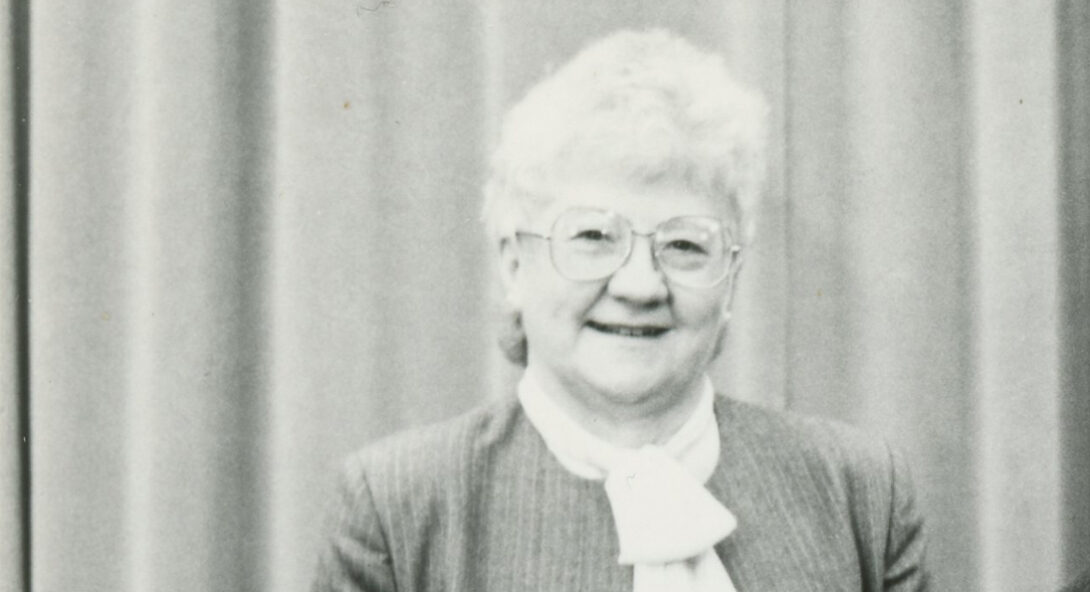
Marjorie Powers, PhD, RN, a UIC College of Nursing professor emerita, helped build the college’s PhD program in the 1970s and 80s and launched the careers of future nursing leaders and prominent researchers.
She died in December at the age of 92 in Albany, New York.
“She played a key role in recruiting stars or to-be-stars for the [Department of Medical Surgical Nursing],” says Mi Ja Kim, PhD, RN, FRCN, FAAN, who was UIC Nursing dean from 1989 to 1995. “The department, the college and the nursing profession benefited from her visionary push for talented faculty to succeed in their research efforts.”
Powers, a native of Troy, New York, received a diploma in nursing and worked at St. Peter’s Hospital in Albany while serving as a nun with the Sisters of Mercy from 1953 to 1965. She received her bachelor’s and master’s degrees in nursing from St. Louis University and her PhD from Case Western Reserve University.
In the mid-1970s, she was recruited by then-dean Helen Grace, PhD, MS ’65, FAAN, to help develop the PhD program at the UIC College of Nursing. At the time, PhD programs in nursing science were just beginning to take root across the nation.
Powers ascended to full professor and head of the Department of Medical Surgical Nursing (now Biobehavioral Nursing Science) at UIC Nursing.
Powers, who had worked with kidney disease patients in the early days of dialysis, conducted research on life satisfaction. An expert in the development of scientific instruments, she collaborated in 1984 with her then-student, Carol Ferrans, PhD ’85, MS ’82, RN, FAAN, on the creation of a tool to measure a patient’s quality of life.
Since then, the Ferrans and Powers Quality of Life Index has been translated into more than 30 languages and cited in more than 4,000 publications.
Ferrans recalls that, at the time, instruments to measure life satisfaction and quality of life were either far too simplistic – involving just one question – or determined by a physician, without the patient’s input.
“I thought quality of life needed to be measured in terms of patients’ perspective, how they judged their own life,” says Ferrans, who is the Harriet H. Werley Chair in Nursing Research emerita. “Marjorie shaped my thinking all along the way. … She didn’t think for you, but she pointed you in a promising direction. She supplied you with what you needed and pushed you out to sea.”
A powerful mentor
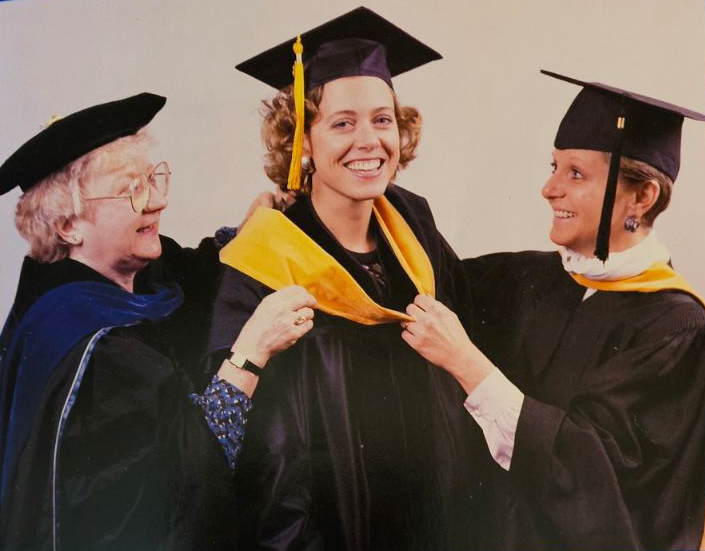
Other former students and colleagues of Powers recall her strength as a mentor and guide.
Holli DeVon, PhD ’02, MS ’82, RN, FAHA, FAAN, Audrienne H. Moseley Endowed Chair in Community Research at UCLA Nursing, says Powers urged her to submit an abstract of her master’s thesis to the American Heart Association, and helped her develop the confidence to present it at the association’s scientific sessions in 1982. Powers wanted her to join the PhD program immediately after getting her master’s degree and persisted in trying to recruit DeVon.
“In every Christmas card I received from her for the next 14 years, she asked if I was applying to the PhD program,” DeVon recalls. “Finally, in 1997, I did. She was so happy.”
Karyn Holm, PhD, RN, FAAN, FAHA, says Powers was among those who recruited her to the college as a new faculty member in 1980. Powers served as a mentor and helped Holm move up in the faculty ranks. Holm recalls visiting her in New York, after Powers had retired, and noticed a photo prominently displayed in her home. It showed Holm and Powers putting graduation regalia on Mariann Piano, PhD ’88, MS ’84, RN, FAAN, FAHA, who is now the senior associate dean for research at the Vanderbilt School of Nursing.
Holm, who served as a mentor to Piano, says the photo represents the power of mentorship.
“It shows how we learn from the generation before us,” she says. “I would say Marjorie Powers is one of those giants. It is without question we stand on her shoulders.”
Friends and colleagues remember Marjorie Powers
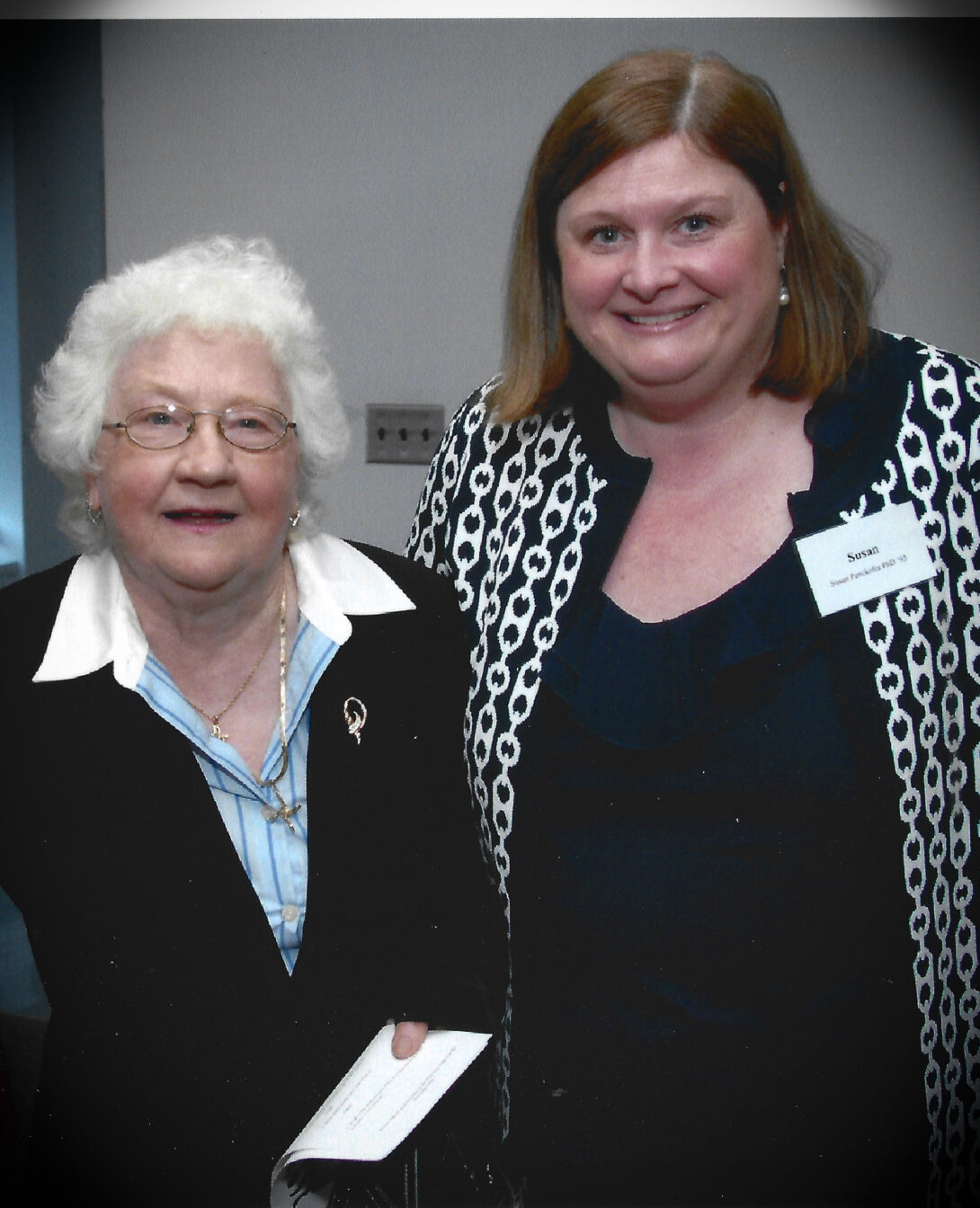
“Marjorie Powers was a scientist, educator, advocate, mentor, friend, dog lover and caregiver. She was my thesis advisor in 1980. I was fortunate to take her classes. She was an excellent teacher and mentor who developed your critical thinking (although we didn’t call it that back then!). Her keen sense of research assisted me to conduct research in women having cardiac surgery, which was in its infancy at that time. She was an advocate for graduate student funding, which assisted me and many others, particularly international students. I came to know her [personally] as we lived near each other. I knew her mother, who she cared for until she passed, as well as her little dog Priscilla. When she returned to New York after retirement, she would often send me research newsclips from the New York Times with notes to ensure I was on the cutting-edge of science. She was a woman who dedicated her life to serving others and had a tremendous impact on them. She is deeply missed.”
— Sue Penckofer, PhD ‘93, MS ‘82, BSN ’79, professor emeritus and Loyola Faculty Scholar in the Marcella Niehoff School of Nursing at Loyola University Chicago
“Marjorie mentored and launched many PhD students who became major leaders in nursing nationally, and also internationally. She was a powerful force in the lives of all her mentees. She could see the possibilities, and she pushed you forward into them, guiding you along the way. She was a superb mentor and guide. She was an expert in instrument development. She was an expert methodologist. She was an expert scientific writer. We all learned scientific writing from Marjorie. She was also an expert grant writer. She guided us in all those things.”
— Carol Ferrans, PhD ’85, MS ’82, RN, FAAN, UIC Nursing professor emerita and Harriet H. Werley Chair in Nursing Research emerita
“Marjorie Powers was among those who recruited me to the college as a new PhD [graduate], circa 1980. She was a mentor for certain, and she was very instrumental in helping me move forward through the ranks to full professor. She was the very best of colleagues and became a very good friend. When she retired, many of us went up to New York to visit.”
— Karyn Holm, PhD, RN FAAN, FAHA, Vincent de Paul Professor Emerita Nursing, DePaul University
body copy
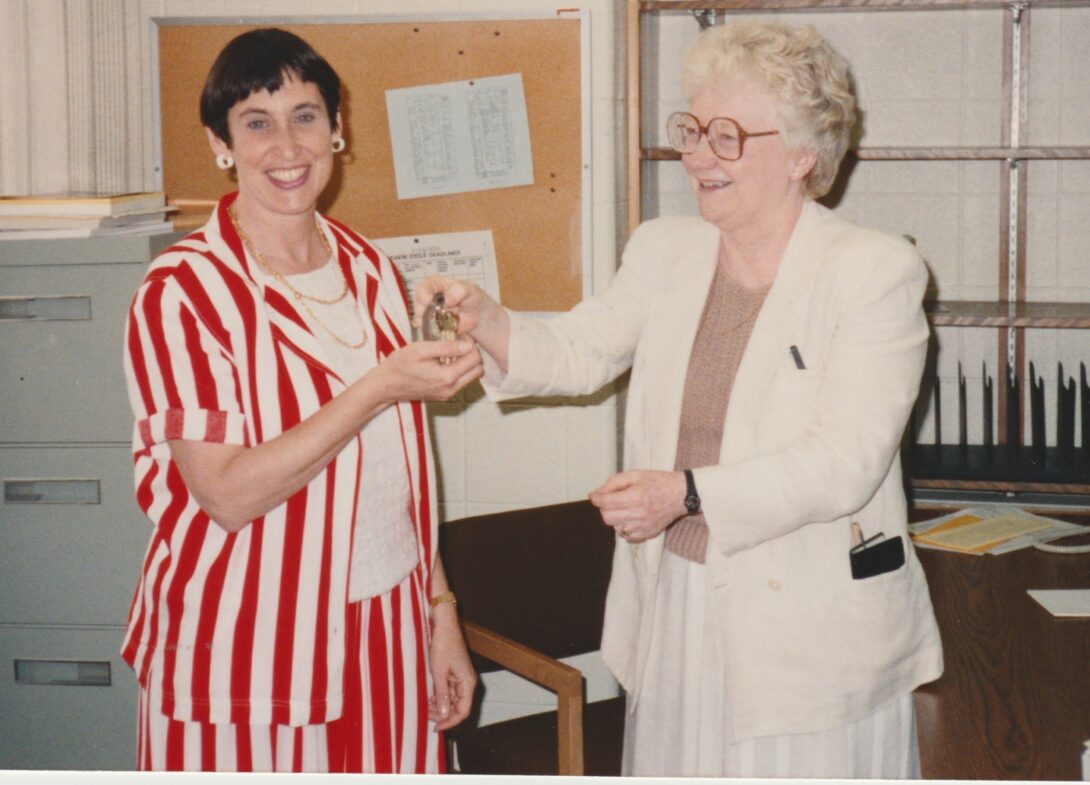
“[Marjorie] became head of the Department of Medical Surgical Nursing, of which I was a member. At the time that I first met her, I was at the Peoria campus and came up to Chicago occasionally. I was also director of the Center for Narcolepsy Research. In 1988, when I was going through a personal issue, she made it possible for me to transfer to the Chicago campus. She spent her time helping me find an apartment and get situated and moved. She didn’t need to go to that extent, and I’ve never forgotten that.”
— Felissa Lashley, PhD, FAAN, former dean of the Southern Illinois University College of Nursing and the Rutgers University College of Nursing
“I met Marjorie when I was assistant professor in the Department of Medical Surgical Nursing. She was a brilliant thinker and an intelligent nurse leader who knew what “quality” is in faculty. She played a key role in recruiting stars or to-be-stars for the department. She was keen on facilitating the success of promising young faculty and provided full support for their success in scholarship, particularly in the areas of grant writing and publications. The department, the college and the nursing profession benefited from her visionary push for talented faculty to succeed in their research efforts.”
— Mi Ja Kim, PhD, RN, FRCN, FAAN, UIC Nursing Dean Emerita
“Dr. Marjorie Powers was a remarkable scholar, devoted to UIC Nursing. She will never be forgotten, especially by those so profoundly impacted by her. She gave me the courage and confidence to pursue new avenues of knowledge generation. She was instrumental in helping me keep on track with the goal of efficiently completing my doctorate. Her support of me was tangible. She was interested in all facets of my life, my husband, children and their success as well.
She was a co-author on the manuscript of my dissertation, “Development of an Instrument to Measure Hope,” which resulted in numerous contacts from researchers around the world. Dr. Powers helped me be successful in obtaining NIH funding. The strength of her CV influenced success in tapping a variety of funding opportunities.
Dr. Powers was a strong advocate for her students. She appeared ready to do anything for them so that they could succeed. She manifested caring and related to all with a tremendous sense of humor. She took great pride in the accomplishments of her students and graduates. She traveled to Milwaukee, to attend the Marquette University reception held for me when I left to become dean at the University of Missouri in 2008. Her depth of kindness, interest and support did not stop when her students graduated.”
— Judith Fitzgerald Miller, PhD ‘86, RN, FAAN, dean emerita and professor, University of Missouri, Sinclair School of Nursing
body copy
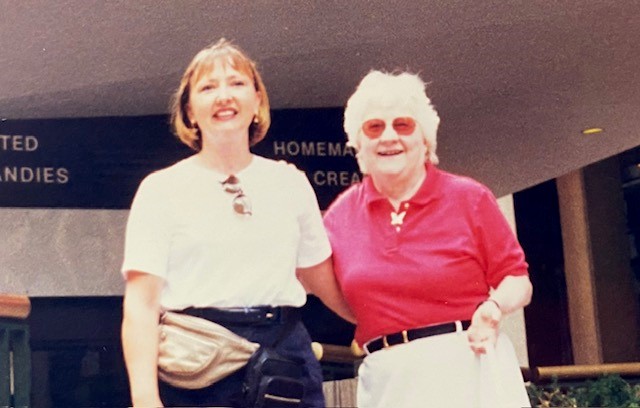
“I entered the Master of Science in Nursing program in the [UIC] College of Nursing in January 1980. I was assigned an advisor like every other student. After one or two quarters, my advisor told me that I was being reassigned to a new one. Apparently, I had not impressed my original advisor, and so I was told me to meet with Dr. Powers. I was nervous but felt immediately at ease with Dr. Powers. She was so smart and so wise, and it helped that I did everything she told me to do. She had many gifts; she was devoted to the nursing profession and to nursing science. She set the bar high, which was something we had in common. She had a great and irreverent sense of humor. She was approachable, warm, and had a way of giving authentic praise for a job well done.”
— Holli DeVon, PhD ’02, MS ’82, RN, FAHA, FAAN, Audrienne H. Moseley Endowed Chair in Community Research at UCLA Nursing